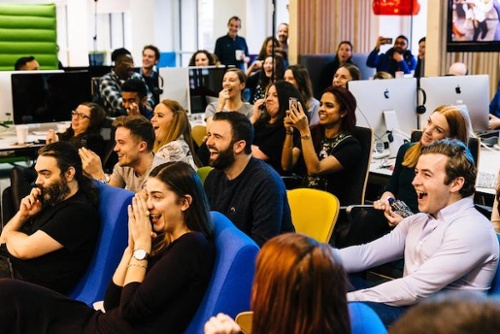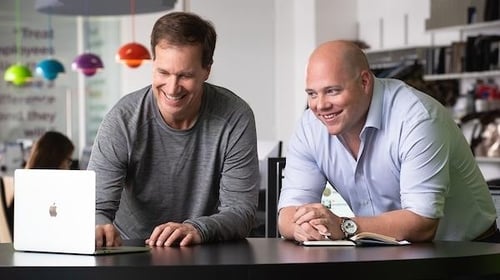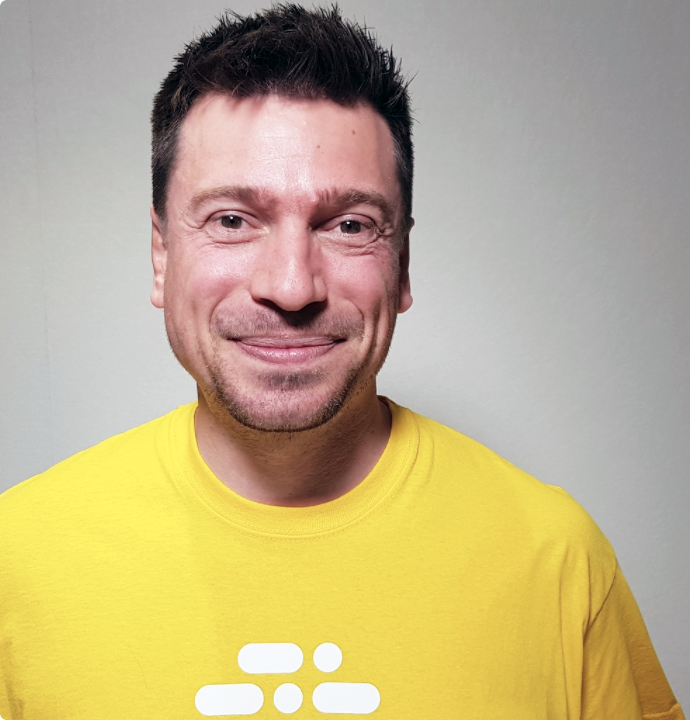.jpg?width=500&name=shutterstock_1008642364%20(wecompress.com).jpg)
5 min read
I was at a friend’s house a few weeks back watching a stand-up comedian on Netflix. We got chatting about what it takes to get to the point where an international production company offers to produce and stream your very own stand-up show. The answer is: Lots of practice, lots of smaller gigs, and lots of willingness to take risks, and of course, lots of feedback and success on stage.
The conversation got me thinking about what we could learn from those comedians (aside from a great punchline) when it comes to our day-to-day work, and specifically, employee engagement.
Sometimes we get caught up in this idea of delivering a grand solution straight off the bat, but building a great place to work doesn’t quite work like that. I find myself talking to people who want to run before they can walk, but it’s important to take a step back and look at the small things we can do, the steps we need to take before we earn the “Netflix special.”
You’ve got to try, test and try again
Comedians start off testing new material at smaller gigs, gauging feedback from those crowds and tweaking their approach until they find the lines that work. Our work is similar, in that we’ve got to be willing to give things a shot even if we’re unsure of how it’ll land.
I get a lot of managers telling us that they don’t recognise employees because they don’t know how to write an effective recognition message, that they’re scared of getting it wrong. That’s ok… but give it a shot anyway.
Try something simple, see how it lands. It might fall flat, but it's still worth a try. You’ve got to miss a few shots before you become a pro, right? The important thing is to keep trying, keep adapting. Seek and listen to feedback, and act on it.

Feedback is crucial to success
Comedians are constantly dealing with positive and negative feedback – sometimes the crowd laughs, other times they’re heckling.
The beauty of live shows is that feedback is immediate, and they can figure out how to change track or improve the next time they deliver.
Looking out for the audience’s response is so important, as is acting on it.
Not many professions receive that type of instant feedback – or even regular feedback – from their peers or managers. Often they’re waiting for an annual performance review before they realise their work landed correctly (by which point they’re detached from the effort anyway), or (worse) that they’re being booed off the stage.
To be successful and nimble, our people need to know if they’re on the right track or if they need to change their approach. Encouraging a culture of immediate, timely recognition is a great facilitator for providing your employees the feedback they crave.
Download our eBook to discover how to make employee recognition more meaningful with these 5 steps »
Understand your audience and adapt
A punchline that causes raucous laughter in Birmingham, UK could fall flat in Sydney, Australia – a good comedian doesn’t assume the talk track is going to be flawless even if they’ve delivered it before. They’ve got to read the crowd, and adapt based on their response.
As leaders, we need to listen to our employees and think about how they want to be recognised.
What works for one won’t necessarily work for another, and we need to respect the communication and thinking preferences of our people if we want to keep them engaged.
Similarly, we need to have that same agility when it comes to our reward and recognition programmes. Maybe the framework or the designs we thought were going to wow our employees aren’t resonating; so how can we change a few things so that the programme we’re providing is relevant and meaningful to our people?

You always need a Plan B… and sometimes a Plan C and D
When a great comedian walks on stage, they do so with an arsenal of segues and jokes that allow them to change the approach based on the audience’s response. They pick their path based on what lands well, and quickly switch to plan B (or C, or D) if jokes aren’t landing at all. This ability to think and respond quickly doesn’t just happen naturally – it takes practice and intention.
As a manager, I too need to act on the feedback my people are giving me. Am I choosing the right time to recognise, or are the awards we’ve rolled out meaningful and motivating? If not, why not, and how do we improve things so that our programme is making a positive difference?
It’s a numbers game
If you listen to interviews with some of the greatest comedians, they’ll all say that part of the success was doing a large number of events; some of them would have done hundreds of tiny gigs in dingy, hole-in-the-wall venues for years before they ever got their own show.
There’s something to be said about the regularity and commitment of those small gigs. Those gigs helped them finesse their technique, it built their familiarity and eventually their confidence.

As leaders we shouldn’t underestimate the power of a regular commitment to recognition.
The more we practice, the better we’ll become at giving it. That’s not to say we just recognise people without thinking about it – quality is just as, if not more important, than quantity.
In the same way a great comedian is intentional with their script, their segues and their punchlines, we need to be intentional with the way we recognise our people, to be fearless in giving scary things a try, and learn to adapt as they give us feedback. The more we can do this, the sooner we’ll have an employee recognition and reward programme that’s worth putting up in lights.

 Dillon Chapman
Dillon Chapman



